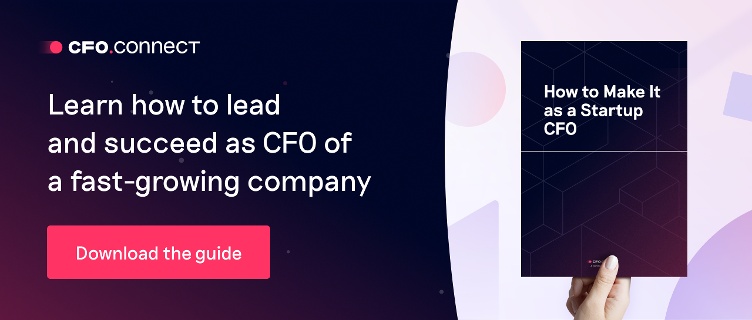)
This startup financing series is a collaboration between Spendesk and CFO Connect. Join this leading finance community here.
I’m very pleased to be able to talk in detail about a funding mechanism close to my heart. As an investor, I get to see the positive impact of revenue-based financing in companies on a daily basis.
This instrument hasn’t really been available to startups until quite recently. Banks offer loans with different repayment mechanisms, and don’t often want to work with unproven companies. And while newer, more modern banks are emerging, most don’t lend to companies just yet.
Which is why I’m excited to talk about revenue-based financing as we’ve built it at Conscious Growth. Our entire purpose is to create founder-friendly financial products, and we’re starting by giving companies short-term cash injections, based on the strengths they’ve already demonstrated.
The result is a lower-risk loan for investors that doesn’t dilute the entrepreneur’s ownership, and the chance for the first to get involved in a range of promising and productive smaller businesses.
We’ll go into the finer points throughout the course of this article. But first, let me explain what this financial instrument looks like for us.
About Conscious Growth
Conscious Growth started in September 2019, and I joined in January as Co-Founder and CIO: both Chief Investment and Impact Officer. For us, these two things go together, and we’ll talk more about the social & environmental DNA of the company soon.
With Conscious Growth, we’re building the first startup bank for good. At its core, the idea is to offer founder-friendly funding with a global impact DNA. We believe that all companies can be people & planet-driven and contribute to the larger change we need to see. Such components are embedded throughout all of our offerings.
Our clients not only need funding, but also a proper banking partner aligned to their values that they can grow with. There’s really a lot of demand and need for an additional player to serve the startup scene. When you look at the nearly 24 million SMBs in Europe, less than 2% of those are banking with a neobank. A lot that still can be done!
And most of the time, what prevents companies from working with those neobanks is that they lack certain services that traditional banks can offer - namely lending and funding. So we’ve started by providing funding because that’s the clearest pressure point we can see for companies.
As mentioned, we’re starting by providing short-term revenue-based financing. But we’ll expand that offering in the future, and along with funding we’ll soon offer accounts and cards.
How revenue-based financing works
We really believe that this is an option that’s been missing in Europe. It’s really interesting for founders because it’s non-dilutive and, in our case, works quickly.
There are different ways to access revenue-based financing and you can use it for different reasons and in different ways. But essentially, it works like this:
A company secures a loan from a lender (like Conscious Growth) for a specific purpose - usually marketing and advertising costs.
The loan is repaid by a fixed percentage of the company’s revenue. The loan has thus a variable lifespan - it might take more or less time to repay, depending on how much revenue the company generates month by month.
If the company sees higher revenue than expected, the debt is then repaid quicker. But if revenues are lower, for instance because of seasonality, the weekly instalment will also end up being lower.
In our case, we initially fund shorter-term expenses and investments that can be repaid within 6-9 months. We look at the marketing expenses of these companies, then at the amount of revenue they’ll likely be generating with more investment, so that we can agree on a percentage of revenue that’ll come back to us to repay the investment within that time frame.
We’re focusing on short-term investments that are revenue-generating, mostly in digital marketing and sales expenses. But also evolving into working capital and other short-term needs companies have.
In Germany, for instance, there are so many digital startups that aren’t venture-backed, but could benefit from such an instrument once they reach sustainable revenue levels. When we look at the full European ecosystem, we see this trend of digitization that’s been sped up by the COVID crisis.
More and more, the SMB profile is going to move from bakeries and small stores, towards digital companies for whom online marketing is the new rent.

Many of our clients are e-commerce or subscription-based models. Not necessarily venture-backed, but performing incredibly well. These days, for instance, if you’re selling home appliances, cooking goods, or athleisure, you could be doing quite well.
You may have bootstrapped your way through this, and now some additional funding for marketing will be hugely beneficial.
How we select companies to fund
For this to work efficiently for us, we really need it to work for the companies too. In a perfect world, every company would pay off their loan within the expected timeframe, and we could engage in conversations for another round after at least ⅔ have been repaid.
As any investor or lender, we do a thorough due diligence to make sure these investments make sense. But our focus is to be as founder-friendly as possible and have very competitive products. That’s why we developed a technology-enabled and data-driven process: so that the process could be automated as much as possible, increasing efficiency, speed, reducing biases and allowing us to scale.
Companies have a very straightforward and simple sign-up and onboarding flow. They answer some questions about the business, and plug in their data sources, like bank accounts, payment processors and digital marketing accounts. This allows us to see past performance, and, along with their business plans, forecast growth for the coming months.
So, it’s not only about past performance - we want to know what they plan to do with the investment. We require a simple P&L and forecasting, and then we can see if their plans are in line with the ability they’ve shown in the past months. We use these forecasts and past performance to then calculate a percentage of revenue that’ll come back to repay us.
So in short, if you’re looking for revenue-based financing, you must be able to show an ability to generate revenue. In our case you must have at least 6 months of consistent revenues and positive unit economics. That means, ideally, you’ll have a clear and positive marketing investment-revenue ratio, so we know that €1 from us will likely return at least €2 to the business, for example.
We normally start funding the first three months of marketing expenses, and then give them some additional time to repay that amount - as we previously mentioned, in total 6 to 9 months. And the beauty of this model is in those shorter time frames, because one can see results fast, there’s not so much room for conditions to change radically and if so, companies can refine their strategies as they go.
We usually work in weekly repayments. So your outstanding loan decreases as you go. And once you’ve repaid two-thirds of the loan, you can take another if that suits your plans. It’s almost like a revolving credit line to invest in your marketing.
Companies that fit this model
Right now, we’re operating with tickets around €100,000, and this Summer we’ll increase that to €150,000 and then towards €300,000. So we’ll be able to work with later stage companies.
Important to highlight: if a company has a €1 million marketing budget for the year, for instance, we could address that with 3 loans of €300,000, covering the expenses as it goes.
When thinking about funding, a company should always consider their stage and the specific needs they have. For different company needs, you’ll want to use different funding structures. For instance, equity and venture debt are both really great to invest in long term investments, like new technologies and product development or fast team scaling, that will take longer to generate revenue.
But why would you use these same structures - which are very expensive for founders at any growth stage - when you can cover shorter-term costs with an instrument like revenue-based financing?
Of course, at a certain size banks will also become an option for companies. Nevertheless, at the early stages, they still don’t really understand startups. They don’t have the flexibility in their underwriting process or the range of offers that would suit a startup stage.
For instance, many of the companies we work with, despite having good unit economics and generating cash, aren’t profitable yet. This factor alone would really harm an early stage company’s risk scoring and thus the conditions to access a bank loan, which would most likely require extensive guarantees.
A few examples
We recently funded a non-venture backed company which is a specialty grocery and spices online store. They showed us consistent revenues and wanted to start properly investing in digital marketing. Based on their revenues and cash balance, we gave them an initial loan to test how the unit economics would behave.
We monitored them weekly, and saw their performance soaring with return on advertising spent well above 1000%. For every dollar they invested in marketing, they got 10 back in revenue.
So this is an example of a company that could perform very well and ended up benefiting from the lockdown measures in Europe. In this case, they ended up re-paying us much faster than expected.
Another case is a client that sells indoor home appliances. We started working with them at the beginning of the year. For them, May and June are the high points for their main products sales because of Summer in the Northern Hemisphere.
Even though one might think that people would be hesitant to buy grills online and be unsure given the pandemic crisis, their sales went up with the seasonality and the new product launched was an absolute success. With that, they’re also repaying faster.
On the other hand, we were working with a company that was a marketplace for large-ticket items. Even though at the beginning of the COVID crisis their performance didn't suffer, we could predict a slow-down from the demand side.
Indeed, in the first month of the loan, they suffered pretty badly. And as a result, they repaid much less during that month. Luckily, there was a bounce-back in the market, and they’re back on track and re-paying more in absolute terms.
Even though we work on projections based a lot on data models, the effects of this crisis were hard to project and it ended up being the ultimate example of how this model is beneficial to businesses. In some cases we have to be patient and allow business performance to catch up.
And sometimes it’s just seasonality.
The benefits of revenue-based funding
There are several reasons why we’ve started our business with this one key funding mechanism. And we think it’s a great opportunity for both startups and other investors.
For startups
As I mentioned above, one clear advantage is the short time frames. Companies receive quick cash for a clearly defined purpose, to support their growth.

The beauty of the revenue-based model is not being attached to a fixed interest expense. If sales are up, the repayment can happen faster. But if revenues go down, you also pay less. So the potential downside isn’t as bad as it might be with other forms of loans. And if the business model performs well, there’s a potential ongoing funding source available to support the positive trajectory.
The other big win, of course, is that it’s non-dilutive - you’re not giving up any equity to get this loan and there’s no need to give any kind of guarantees. You’re instead offering a limited portion of your future revenue in exchange for the money you need now.
And the other big advantage of Conscious Growth specifically, is that this funding isn’t available from the traditional banks for startups. So the mere fact that we exist is a benefit, too.
For investors
That last point begs the question: why is this good for us? If it’s so interesting, wouldn’t banks offer the same thing?
But our motivations and knowledge are different. Investors like us love that they’re still funding innovation and early stage companies, and doing so at a good return. These usually have plenty of risks, but we’ve put steps in place to mitigate these.
For instance, many companies may perform well for one or two years, but eventually blow out, or will perform well but never become an unicorn. Revenue-based investors aren’t on the hook for the entire life of the company - they can still make interesting profits from the investment but not rely on the company having to outperform all other investments. So we reduce the exposure we have to those risks.
Also, investors normally see returns much lower than we’ve been able to offer, at a limited risk level. We have full visibility of the company’s bank accounts, marketing investments, and payment processors, and we always have real-time data, that lets us properly understand the skills of the entrepreneurs, and map potential pitfalls early on.
And then there’s the conscious mindset. As a financial player, we understand our real responsibility towards shaping the future. That means financial performance, but also the company’s role in the world from a social and environmental perspective, which is crucial for the companies we take on.
First, we have really clear screening requirements at the beginning. We exclude companies that are harmful themselves, serving harmful industries, or relying on harmful suppliers. We do a basic X-ray on their level of impact at the beginning, and then offer tips and hints to help them become more impactful on their own depending on the development stage, business model and industry.
So we have a really interesting product that would work on its own, and we also incorporate this conscious entrepreneurship aspect. Investors and companies both love that. They want to do business with companies that have these values. And issues like climate action and social responsibility are becoming more important every day.
Potential downsides
Of course, there has to be some sort of “catch.” I’m very confident that the companies we work with see the very real benefits of this approach, but it won’t work for absolutely everyone.
If you are very confident that you’ll generate much more revenue than you’ve forecast, then you’ll end up re-paying much faster. This then makes your relative costs higher, because we charge a flat fee. So if by any chance you perform much better than you forecast, you’ll still end up paying the same fee, but you’d “use” the loan for a shorter period of time.
Then, obviously, if you’re not generating revenue, you can’t use this instrument. Even those startups on the cusp of generating revenue aren’t able to use it. So that’s a downside for a pretty large group of early-stage businesses, which should rely on other funding sources for the beginning of their activities.
And there’s also the possibility that a bank might offer a more interesting rate eventually. Usually the conditions and structures aren’t as well-suited to startups, but some smart businesses can find ways to make them work to their advantage. These are the exceptions to the rule, however.
In our case, it might be a bit more expensive than some banks are offering. But the funds are available much faster. Sometimes, the bank rates might be cheaper but there can be so many personal guarantees and warranties involved, that the burden simply isn’t worth it for founders.
So it’s always going to be a balancing exercise for companies.
Conclusion
Revenue-based financing presents a real opportunity to startups with a certain profile, and can be the perfect complement to your existing funding - equity-based or not.
For companies with predictable revenue and a clear path to growth, this is a way to increase working capital quickly and launch marketing campaigns that have so far been a dream. And of course, without handing over any more precious equity.
At Conscious Growth, we also see this as the perfect instrument to give ethical, sustainable businesses a head start. If you can show that your business model works and you’re building a better future, this could be just the launchpad you need.
Read more on startup financing
Beyond equity: the full range of startup financing instruments
What is venture debt? A complementary alternative to venture capital
Supply chain financing: a smart solution for fast working capital
Inventory financing for startups: how to grow with debt funding
------------
Julia M. Profeta Johansson is Co-Founder and CIO at Conscious Growth. Prior to this role, she founded Ella Impact, JPJ Lab and was a partner at Vox Capital. Throughout her career, Julia has focused on impactful business and invested in positive change, worked with Nobel Peace Prize winner Professor Muhammad Yunus and built a lot of her knowledge while working in banking.
)

)
)
)
)
)
)